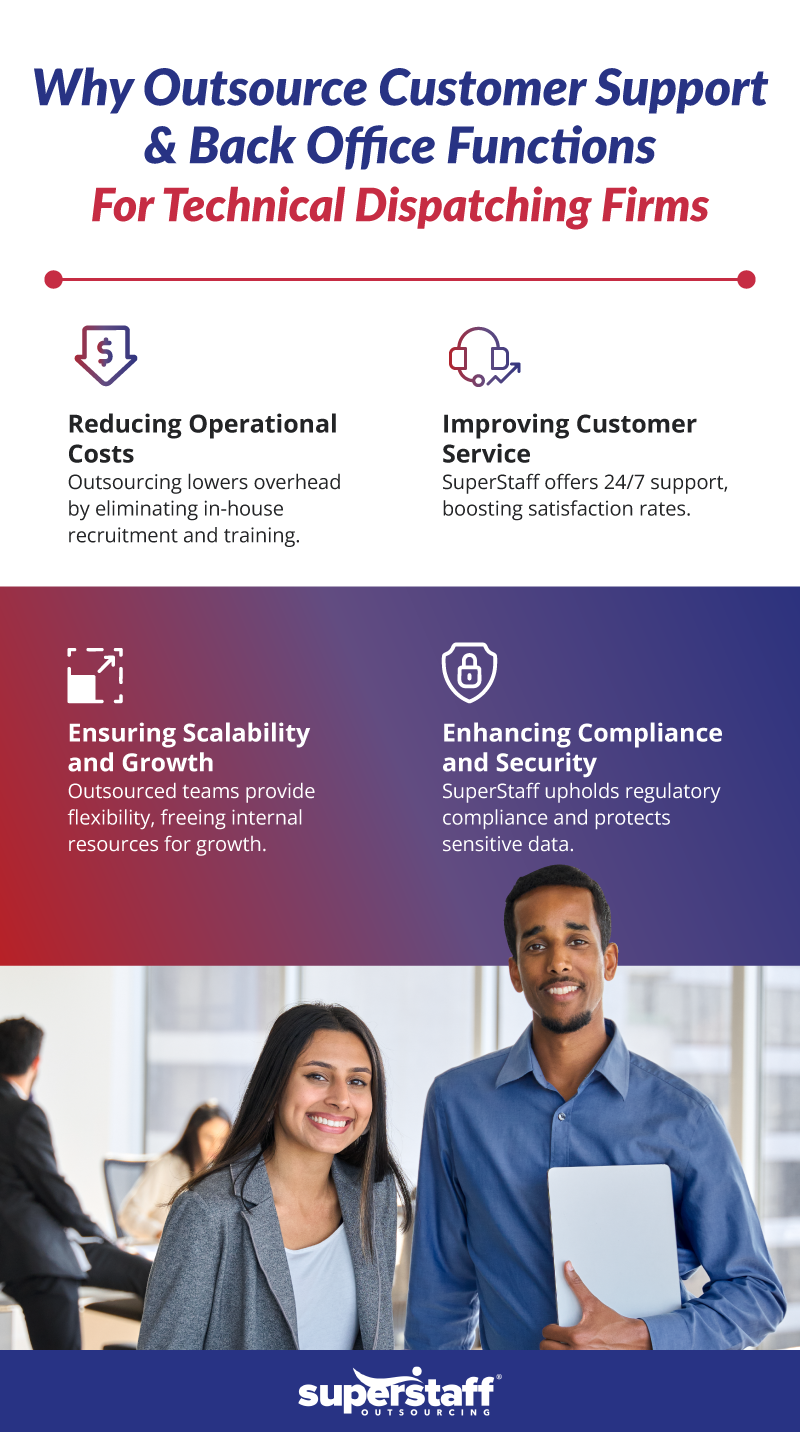
In industries like telecommunications, utilities, and field services, technical dispatching firms are the unsung heroes behind smooth operations. They ensure technicians are dispatched swiftly, services are delivered on time, and customer requests are addressed without delay—critical elements that keep businesses running at peak performance.
However, as your company scales, managing customer support and back-office functions can quickly become a major drain on time and resources. The more effort spent on these routine tasks, the less focus is left for what truly drives your business forward: innovation and growth.
This is where outsourcing can transform your operations. By partnering with specialized providers for functions like call handling, scheduling, billing, and data management, you can simplify processes, cut overhead costs, and elevate service quality across the board.
Outsourcing frees you up to optimize your technical dispatching, all while ensuring your customers receive top-tier support. In this article, we’ll dive into how outsourcing can seamlessly integrate with your operations, boost efficiency, and fuel the growth your business deserves.
The Role of Technical Dispatchers (+Types)
At the heart of every successful service-based technical firm lies a critical role: the dispatcher. As a dispatcher, you are the essential bridge connecting customers, technicians, and your company’s services.
Coordinating Technician Schedules
One of the core responsibilities of technical dispatchers is assigning the right technician to each service call. This task requires balancing multiple factors, including the technician’s location, expertise, and availability. Efficient scheduling reduces travel time, ensures timely service, and maximizes resource utilization, driving operational efficiency.
Managing Customer Communications
Dispatchers often serve as the first point of contact for customers, managing inquiries, providing service updates, and resolving scheduling conflicts. Clear, consistent communication is essential. It addresses issues quickly and builds trust, ensuring customers feel informed and supported at every step of the process.
Tracking Service Progress
Technical dispatchers also play a critical role in overseeing ongoing services to ensure timely delivery. When unexpected delays or the need for additional resources arise, they take swift action—troubleshooting problems and implementing solutions to keep operations on track and maintain seamless service delivery.
Types of Technical Dispatching Services
Technical dispatching services are the backbone of many industries, each with its complexities and operational demands. These services are vital to maintaining efficiency, meeting customer expectations, and driving business success. Let’s look closer at the sectors where dispatching is not just a function but a strategic advantage.
Emergency Dispatching
Emergency dispatchers, perhaps the most familiar to the public due to their frequent portrayal in media, handle critical service requests where every second counts. Their responsibilities extend beyond simply routing calls—they make rapid, informed decisions that can prevent costly mistakes or even save lives.
Examples include healthcare call centers, where dispatchers coordinate ambulance services and connect patients with the right medical resources, and firefighting dispatchers, who must quickly assess situations, allocate resources, and provide essential information to first responders. These roles demand a unique combination of technical proficiency, emotional resilience, and the ability to remain calm under pressure.
Telecom Dispatching
Telecom dispatchers are pivotal in ensuring seamless communication services by assigning technicians to handle network installations, troubleshooting, and maintenance tasks. Precision and speed are non-negotiable in an industry where customers expect uninterrupted connectivity. Dispatchers must carefully coordinate schedules, optimize routes, and ensure that technicians with the right expertise are deployed, all while addressing unexpected challenges to uphold service reliability and customer satisfaction.
Utilities Dispatching
Dispatchers are the linchpin of efficient field service operations for water, electricity, and gas utilities. They coordinate outage responses, schedule maintenance, and manage service requests precisely. Rapid decision-making and effective resource allocation are critical to minimizing disruptions, maintaining customer satisfaction, and safeguarding essential services that communities rely on daily.
Home Services Dispatching
Dispatchers for HVAC, plumbing, and other home services ensure homeowners receive timely and dependable solutions for critical needs. Efficiently managing technician schedules, prioritizing urgent requests, and coordinating resources help maintain customer satisfaction and build trust. Their ability to deliver prompt and reliable assistance plays a vital role in upholding the reputation of service providers in these industries.
Challenges Faced by Technical Dispatching Firms
Technical dispatching firms are crucial in bridging the gap between service providers and customers, ensuring seamless operations and high-quality service delivery. However, they often face challenges that can disrupt efficiency and compromise service standards. Addressing these obstacles is essential to maintaining performance and meeting customer expectations.
Handling High Call Volumes and Service Requests
One of the most pressing challenges for dispatching teams is managing a high volume of calls and service requests. During peak periods, they often struggle to balance multiple customer inquiries, handle escalations, and coordinate technician assignments effectively.
These backlogs can lead to delayed response times, creating frustration and dissatisfaction among customers. In industries like telecommunications, for example, overwhelmed dispatchers and unresolved service requests are frequently cited as significant contributors to increased customer churn. Addressing this issue requires robust systems, clear processes, and scalable solutions to handle demand without compromising service quality.
Balancing Operational Efficiency With Quality
Dispatchers face the intricate task of optimizing technician schedules while upholding high service standards. Assigning the right technician requires careful consideration of factors like expertise, location, and availability, all while ensuring quality remains uncompromised.
A significant challenge emerges when tight schedules push teams to prioritize speed over consistency. This can lead to oversights that directly impact customer satisfaction. In the utilities sector, for instance, a poorly coordinated schedule might delay critical repairs, disrupting essential services for entire communities. Striking a balance between efficiency and quality is crucial to maintaining trust and reliability.
Navigating Workforce Limitations
Labor shortages and scalability challenges are significant hurdles that can disrupt dispatching efficiency. Recruiting and retaining skilled dispatchers is an ongoing struggle, especially as the role demands a mix of technical expertise, communication skills, and the ability to perform under pressure. Scaling the workforce during peak seasons without escalating costs adds another layer of complexity.
For example, a field services firm may face surging demand for HVAC repairs during the summer months. Without sufficient staffing, delays in scheduling and service delivery can lead to dissatisfied customers, missed opportunities, and strained operations. Addressing these issues requires innovative workforce solutions and strategic planning to ensure scalability without sacrificing quality.
Minimizing Operational Costs
Rising operational expenses present a major challenge for technical dispatching firms. Hiring and training in-house dispatchers, along with overseeing back-office functions, can quickly stretch budgets thin. As businesses grow, the need to allocate limited resources effectively becomes a complex balancing act. Dispatchers must juggle customer service, technician management, and administrative duties—each demanding attention and precision. Without careful planning, the strain on resources can hinder operational efficiency and compromise service quality. Finding cost-effective solutions that streamline these tasks is essential for long-term success and sustainability.
Keeping Up With Technological Advancements
Adopting new technologies, such as AI-driven scheduling tools or advanced CRM systems, is essential for staying competitive in today’s fast-paced environment. These innovations help streamline operations, enhance decision-making, and improve customer service. However, the integration of such tools often requires a significant investment in both software and employee upskilling, which can be a challenge for firms operating with tight budgets or limited technical expertise.
Firms that hesitate to modernize risk falling behind competitors who embrace automation, machine learning, and advanced analytics. Without these tools, organizations may struggle to maintain efficiency, deliver consistent service, and adapt to changing customer demands, ultimately losing their competitive edge.
4 Reasons To Outsource Customer Support and Back Office Functions for Technical Dispatching Firms
Outsourcing customer support and back-office functions presents a strategic solution to the challenges faced by technical dispatching firms. By partnering with experts like SuperStaff, companies can streamline operations, reduce operational costs, and significantly enhance service delivery. Outsourcing allows businesses to offload non-core tasks, ensuring they can focus on what truly matters—achieving their core goals, driving growth, and staying ahead in an increasingly competitive market. Leveraging specialized expertise helps businesses maintain high-quality service while optimizing resources for long-term success.
Reducing operational costs
Outsourcing removes the burden of recruiting, training, and maintaining full-time staff for non-core functions, offering significant cost savings. By partnering with specialized providers, firms can access highly skilled professionals without the overhead costs associated with in-house teams. For instance, companies can save up to 70% on labor costs by outsourcing to the Philippines—a country known for its high-quality service standards and lower wage rates. This cost-effective strategy allows businesses to reallocate resources to strategic initiatives, ensuring both operational efficiency and competitive advantage.
Ensuring scalability and business growth
Outsourcing offers unmatched flexibility, allowing businesses to scale operations up or down during peak seasons or times of fluctuating demand. This agility ensures that you can effectively manage surges in service requests without overwhelming your in-house team. If you choose a nearshore solution, you can further eliminate concerns about time zone differences, ensuring seamless communication and efficient service delivery.
Additionally, outsourcing administrative functions frees up valuable internal resources, empowering your team to focus on high-priority growth initiatives. With a trusted partner like SuperStaff, you can quickly adapt to market changes, staying ahead of the competition while maintaining exceptional service standards.
Improving customer service quality
Outsourced customer service ensures round-the-clock availability, offering customers support whenever they need it without stretching your in-house team. In addition, outsourced agents bring specialized skills and advanced training, driving higher satisfaction rates. For instance, offering multilingual customer service can help your business engage with a wider, more diverse customer base.
Research shows that 89% of consumers are more likely to return to a business after a positive service experience—a result that outsourcing can help facilitate. SuperStaff’s customer-centric solutions are specifically designed to meet your unique needs, ensuring that you not only satisfy customers but also build lasting relationships that drive repeat business and long-term growth.
Enhancing compliance and data security
Outsourcing providers place a high priority on compliance with regulations such as HIPAA, GDPR, and industry-specific standards, ensuring that sensitive customer and operational data is handled with the utmost security and responsibility. This commitment minimizes the risk of regulatory violations and data breaches, safeguarding your business’s reputation.
Furthermore, outsourcing firms invest in cutting-edge technologies like encrypted communication platforms and robust data protection systems, further reducing the risk of security breaches. With global businesses facing an average cost of $4.88 million per data breach in 2024, partnering with an outsourcing provider can significantly mitigate these risks.
SuperStaff ensures your dispatching firm remains compliant and secure, allowing you to focus on delivering exceptional service without the added concern of data protection.
A Smarter Way to Dispatch Success
Technical dispatching firms play a crucial role in connecting customers with essential services, yet operational challenges can often disrupt efficiency and service quality. Outsourcing back-office functions and customer support can be a transformative solution to optimize dispatch operations and streamline service delivery.
Partnering with SuperStaff brings substantial cost savings, enhanced operational efficiency, and improved customer satisfaction. With 24/7 expert support and a proven track record of assisting dispatching firms, SuperStaff ensures compliance, scalability, and exceptional service tailored to your unique needs.
Ready to tackle your operational challenges and accelerate growth? Contact us today to explore how our back-office outsourcing services and nearshore call centers can give you a strategic edge!







